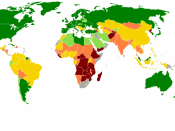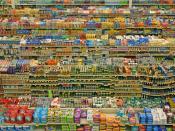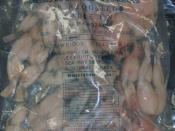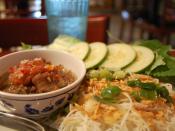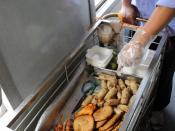Set in the 1980s, Duong Thu Huong's 'Paradise of the Blind' narrates the life of a 20 years old Vietnamese lady, Hang, as she makes a long train ride to Moscow where she reflects on her childhood in Vietnam during the time of Communist reign. Throughout the novel, Huong conveys the story in the perspective of Hang using different motifs. Unquestionably, one such motif is the use food, which is recurrent and significant. In the two selected passages from Paradise of the Blind, Huong emphasizes that food, which reveals one's status in the hierarchy of the social order, is often a powerful form of human expression that is used to quantify one's love and respect from others, specifically among family members.
In both passages, food is carried out as a representation of one's social status in the hierarchy present in Vietnam during the times of the revolution.
In the first passage, Aunt Tam hosts a huge banquet celebrating Hang's entry into university. With regard to guests attending the feast, Aunt Tam claims that "[t]here are going to be a lot of guests" (146), many of which are "important people in [the] village" (147) such as Duong, the vice president. From this passage, her high and respectable status in the society is revealed. In comparison with other paragraphs in the passage, Huong has written an oddly long paragraph with great amount of details in describing the luxury food offered in the banquet. This suggests the emphasis to the readers that only people of a higher class can enjoy the diverse delicious Vietnamese food. Contrasting from that, during the time when Aunt Tam was denounced, she has to sell cheap food for survival. Thus, the motif of food is significant towards the character development of Aunt Tam, as it is the main cause she is able to regain the wealth and reputable status, which she now obtains. Additionally, Aunt Tam is neither hosting any feast nor a dinner but rather a 'banquet'. The diction employed suggests a much of a higher class and formal event, once again reminding readers the high standing of Aunt Tam, as well as her stable and good quality of life. Therefore, the recurring usage of food symbolizes different status in society and financial position of people during the setting of the book.
Similarly, the motif of food is present in the second passage to exemplify the social class of the characters. However, the representation leans towards the lower end of the hierarchy, illustrating the situation within poor financial famalies. When Chinh falls ill with diabetes, Que provides him with food and medicine, which causes "[their] meals to shrink by the day" (179). Totally contrary to the first passage, Que and Hang do not even have enough money to eat a decent healthy meal. In "[m]ost days, all [they] ate were cheap greens. In the end, [they] just a bit of minced banana stalk." (179) It has been clear that as the financial position of Hang and Que decreases, the food that they eat are greatly affected as well. In the beginning of the passage, the transformation of their meals from roast pork to banana stalk is written with details. Yet, as food symbolizes different status one has in society, this transformation of meals metaphorically represents the Que and Hang's change from the middle of the society dropping towards the bottom.
By closely viewing the significance of food, it is seen that food is also a representation of human expression of love and respect through familial bonds. To treat Uncle Chinh's diabetes, Que sacrifices her own food and money, directly dragging both Que and Hang towards poverty. Such action has proven how much Que loves and cares about Uncle Chinh. Not only is Que sacrificing herself, but also the health of Hang, who she really treasures and cares. Recall a time when she argues with Chinh, she questions, "But you will, at least, allow me to provide food and education for my own daughter?" (51) The reference to 'providing food for Hang' shows that she cares a lot about Hang. However, in spite of how Hang is suffering from starvation by the day, Que is still willing to sacrifice their own food for Uncle Chinh. Not only is she suffering from the lack of nutrition due to the poor quality of food, but she has "skipped her noon meals" that caused her "face [to be] hollow and pinched." Hence, one can see that the love and care between Que and Chinh is present through Que's action of sacrificing her own food-from fairly decent to abnormally unhealthy-for the comfort and rehabilitation of her dear brother. Aside of this, Hang emphasizes that "[she]'ll never forget that dish", which is a bit of pickled white cabbage fried in a spoonful of fat and that "the taste of it will probably follow [her] to [her] grave." (179) Huong's choice of diction strongly emphasizes how bad the foods are, as well as how heavily it impacts on Hang's life. Obviously, she hates the situation. Yet, although she can secretly sell Aunt Tam's rings or seek help from Aunt Tam, she decides to stay with her mother and share the pain together as a family. She understands the importance of family and she knows that all Uncle Chinh has left in their family is his sister, Que. Hence, she respects how Que is sacrificing for him and keeps herself from complaining about the terrible situation of the food. Furthermore, as she seasoned the cabbage with grease "and create the illusion that [she was] eating a bit of meat or marinated fish,"(179) she understands the current situation, and instead of complaining, she blinds herself into thinking that her life is still normal. Through the usage of food, one can see Hang's fondness and care for Que reflected upon her actions within this passage.
On the other hand, the first passage symbolizes Aunt Tam's tenderness for Hang. Since "[t]his is the first time a member of the Tran family, [Hang], has made it into the university," Aunt Tam has hosted a massive banquet, where the food "is three times as much food as at any banquet [they] ever had in [the] village." (147) This illustrates Aunt Tam's strong family bonding with Hang, treating her like her own daughter, as to she's the only closest blood relative. Tam "[has] been waiting a long time to give this banquet" (147) where she spends lots of time and effort into. As seen earlier in the chapter, Aunt Tam, "one of the only human beings dear to [Hang]," has "stayed up all night"(143) to prepare for the food and the feast. In regards to Aunt Tam's preparation prior the feast, the immeasurable amount of effort and time she spends into the food symbolizes the amount of affection she has for Hang. Nevertheless, even Hang claims, "[i]t was through [Aunt Tam] that I knew the tenderness of this world." (143) The usage of the word 'tenderness' perfectly describes and further emphasizes the love Aunt Tam, as a family relative, provides to Hang. Thus, through Aunt Tam's process of preparing the banquet and making the food, Hang feels how much she cares about her.
In conclusion, although the imagery of food may have many different meanings throughout 'Paradise of the Blind', it signifies one's social status in the Vietnam society as well as the care and affection of family bonding. The warmth caused by the love and care between family members touches the readers' hearts. Symbolically through the motif of food, Duong Thu Huong has conveyed the message that no matter how bad the situation is, family relationship and bonding is the most important thing in the world; and the love and care of a family is life's greats blessing. As Dan Wilcox once wrote, "I don't care how poor a man is; if he has family, he's rich."BibliographyThe novel Paradise of the Blind written by Duong Thu Huong
